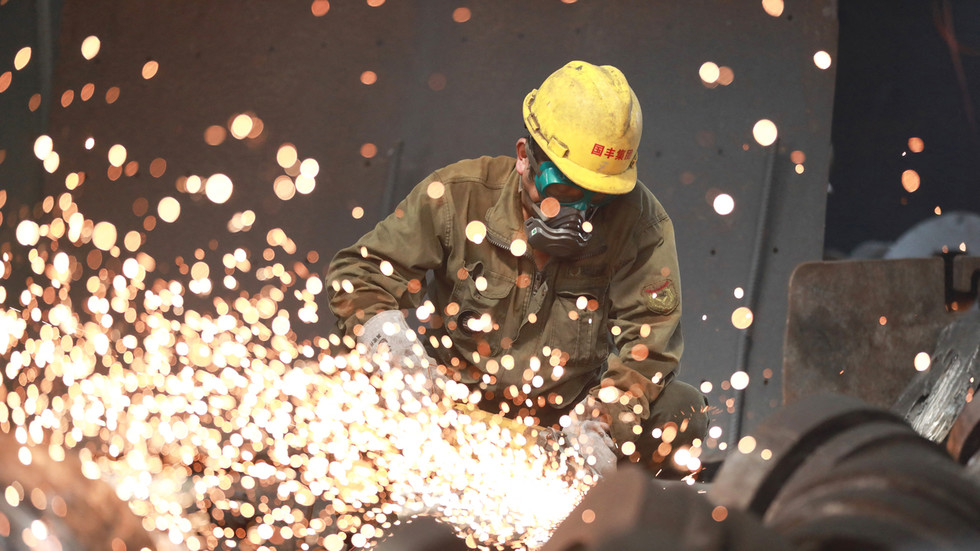
Washington is eager to amplify any trouble Beijing is facing to chase away investors and cull growth
By Timur Fomenko, a political analyst

Worker welding metal at a factory in Hangzhou in China’s eastern Zhejiang province © STR / AFP
The economy of China is clearly undergoing some difficulties. A slowing property market – combined with rising youth unemployment and a fall in new loans – are not signs for optimism.
After the world’s second largest economy emerged from years of Covid-19 restrictions in January and opened up again, it was anticipated it would take the year by storm. That isn’t happening, and instead Beijing has lost momentum.
To little surprise, these economic difficulties have fed an onslaught of Western media commentary, forecasting doom and gloom for China’s economy, declaring that the country’s rise and economic boom is over and nothing but decline lies ahead for it now. Such coverage of late has always been purposefully negative – something to be mindful of when assessing how things are going in China. The US wants nothing more than to discourage foreign investment, economic engagement, and trade with China as part of its own agenda, and the media are actively complicit in that agenda.
The US does not want to see the rise of China as an economic superpower, in any capacity, and will do everything in its power to try and arrest its growth. US measures against China, particularly targeting the high-tech sector of its economy, continue to grow in magnitude and severity. But on top of that, the US does not want to see China succeed in any way, knowing that, should Beijing become the world’s largest economy, the psychological impact of that will be massive. If we look at the containment of the Soviet Union as a model, the US wants nothing more than for China to slow down, stagnate and, therefore, fail to keep up in terms of the broader global strategic struggle.

Read more
Thus, since the anti-China agenda was rolled out, Western media coverage of China has become overwhelmingly negative, even when it isn’t merited, and seeks time and again to plant a narrative of “failure” concerning the governance of Xi Jinping over the country’s economy. To be fair, as this strategic context has moved in, the environment for China to grow and develop has indeed become less favorable. The US has placed hundreds of billions of tariffs on the import of Chinese goods, which it refuses to change as part of a broader strategy to facilitate supply chain shifts. It is deliberately escalating geopolitical tensions in order to spook foreign investors to stay away from China. Finally, it has blacklisted Chinese companies and sought to block China from expanding economic ties with any allied country.
The US is waging a comprehensive psychological, economic, diplomatic, and military hybrid war on Beijing on every front, and a key part of that effort is undermining confidence in China’s economy by removing the certainty, stability, and peace that Beijing thrived on. This is why Xi Jinping has acknowledged that China’s economic growth must be based more on its own market and development, as opposed to overseas deals. But, of course, all of this does not mean that the doom-mongering by the media is accurate. It is conveniently forgotten that the global economic climate as a whole right now is poor. The Eurozone, for one, faces stagnant growth and is teetering on the brink of recession.
Rampant inflation, triggered by the conflict in Ukraine in the already poor aftermath of the Covid-19 pandemic, has suppressed global consumption worldwide. Therefore, there is less investment and less trade to be had overall with China, therefore dragging its growth down. This is basic economics. The media coverage, however, twists this to be a political statement against Xi Jinping and an advocation of the US’ “decoupling” agenda, as if nothing else is going on.
In this case, China needs to be more overt in seizing the “psychological initiative” and demonstrating strength in its own economy. It needs to kickstart something. Because, in the end, businessmen don’t simply follow “US narratives,” they follow a balance of incentives vs. risks. Right now, the US and its negativity agenda is amplifying the risks, but if China can display confidence in its own leadership, government and success, like it did in the first year of the Covid-19 pandemic in 2020, it can woo back investors and businesses again and undermine US objectives. What we need to understand is that competition between the US and China is as much a psychological one as it is economic and strategic. Washington wants Beijing to feel hopeless to the point that it subverts all thinking and that becomes “the norm.” But a lot can change in politics, and China still has plenty of opportunities to act.
The statements, views and opinions expressed in this column are solely those of the author and do not necessarily represent those of RT.




